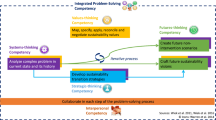Abstract
The difference between the skills required to carry out a task and the actual skills possessed by an individual is referred to as skills gap, and its analysis was carried out in seven randomly selected higher educational institutions (HEIs) in West Africa under the auspices of a European Union-funded project in 2009/2010 with contract number 197625 (old ref: 9-ACP-RPR-118). The project objective was to conduct an inventory of competencies and skills of employees directly involved in manpower development, facilities, and capabilities in these HEIs with a view of identifying critical skills required to achieve competence by the relevant staff and suggest interventions that can address the shortfalls in competency and facilities. Strengths, weaknesses, opportunities, and threats (SWOT) analysis was used to appraise the status of the HEIs in relation to organic agriculture and appropriate strategies articulated to address the identified threats. About 98.1 % of the HEIs’ faculty staff possessed a postgraduate degree in the field of agriculture, and those directly involved in organic agriculture training had core competencies in crops (41.4 %), livestock (21.9 %), marketing (9.0 %), food science and technology (7.5 %), plant health (6.2 %), aquaculture (5.6 %), agro-forestry (3.1 %), animal health (1.9 %), and others (5.6 %). Appraisal of the adequacy of critical skills in 29 areas of specialization by staff in core areas revealed that 8 were adequate, 13 inadequate, and 8 grossly inadequate. Organic standard development and certification, organic livestock production, organic aquaculture management, and organic crop production were identified as key areas of specialization where training is required to close the identified gaps.
Similar content being viewed by others
References
Abdellah GA, Taher SEM, Ismail EA (2011) Enhancing agricultural education in Egypt through competitive mechanism. http://www.heepf.org.eg/pdf. 04/12/2014
African Union Commission (2006) Second decade of education for Africa (2006–2015). Action Plan, Revised in August, 2006 at the Second Extraordinary Meeting of the Conference of Ministers of Education of the African Union (COMEDAF II+) held on 4–7 September, 2006 at Maputo, Mozambique. EXT/AU/EXP/EDUC/2/II 60 pg
Castellini A, Boni AD, Gaviglio A, Machuracher C, Ragazzoni A, Roma R (2012) Prospects and challenges for development of organic fish farming in Italy. New Medit N 4:23–26, Special issue
Chatani K (2010) Skills gap analysis in Aceh. From reconstruction to sustainable growth through skills development. Discussion paper. ILO Jakarta Office. p 30
Dietler C (2003) Report of the need assessment of Indian organic agriculture submitted to the State Secretariat for Economic Affairs (SECO) on the need assessment carried out from December 8–12, 2003
Dyson RG (2004) Strategic development and SWOT analysis at Warwick. Eur J Oper Res 152:631–640
FAO/WFP (2014) Food security and humanitarian implications in West Africa and the Sahel. No 58:6
Halberg N (2006) The impact of organic farming on food security in a regional and global perspective. International Food Policy Research Institute (IFPRI)
Joni R (2008) Skills gap analysis: analyzing proficiency levels using competency profiles as benchmarks. http://suite101.com/article/skill-gap-analysis-a87351
Learned EP, Christensen CR, Andrews KE, Guth WD (1965) Business policy: text and cases. Irwin, Homewood
Panagiotou G (2003) Bringing SWOT into focus. Bus Strateg Rev 14:8–10
Panyakul V (2009) Organic agriculture in Laos PDR: overview and development options. Earth Net Foundation/Green Net. International Trade Center’s project “Support to trade promotion and export development in Laos PDR” Project number LAO/61/89
Rawlins J, Marasini M (2011) Are the construction graduates on CIOB accredited degree courses meeting the skills required by the industry? In: Egbu C, Lou ECW (eds) Proceedings 27th annual ARCOM Conference, 5–7 September, 2011. Association of Researchers in Construction Management, Bristol, pp 167–174
USAID Competitiveness Project Serbia (2008) Skills gap analysis in the IT, film production, apparel and education sectors of the Serbian economy. pp 44
Watt G, Ellison S, Macdonald W (2009) Training needs and gap analysis of healthcare staff working with adolescent patients NHS Education for Scotland. Blake Steveson’s final report. p 160
Acknowledgments
The authors are very grateful to the European Union (EU) for funding the project with contract number 197625 (old ref: 9-ACP-RPR-118) and Coventry University, UK, for coordinating the project. The input of Prof. S. A. Osei, Science and Technology, Kumasi, and Mr. T. Winnebah is acknowledged with thanks.
Author information
Authors and Affiliations
Corresponding author
Rights and permissions
About this article
Cite this article
Aiyelaagbe, I.O.O., Harris, P.J.C. & Olowe, V.I.O. Skills gaps in organic agriculture and SWOT analysis in higher educational institutions (HEIs) in Anglophone West Africa. Org. Agr. 6, 109–118 (2016). https://doi.org/10.1007/s13165-015-0119-1
Received:
Accepted:
Published:
Issue Date:
DOI: https://doi.org/10.1007/s13165-015-0119-1




